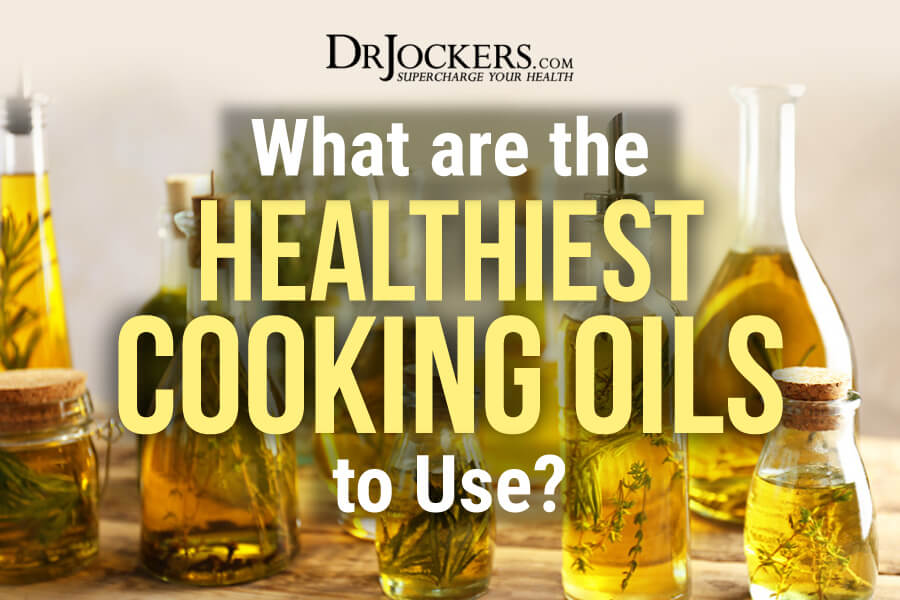 What are The Healthiest Cooking Oils to Use?
What are The Healthiest Cooking Oils to Use?
Are fats healthy? Can I use cooking oils without sacrificing my health? These are some great questions, and there is a lot of confusion around them.
Fats are not your enemy. Healthy fats are your friends. Your body needs healthy fats for hormonal and brain health, energy, immune function, blood sugar levels, and other areas of your health.
Healthy fats, including healthy cooking oils, are an important and healthy part of your diet. Once you know which fats and cooking oils are good for your body, it is simple to incorporate them into your meals and improve your health with each bite.
In this article, you will learn about the importance of healthy fats. You will understand the difference between saturated, monounsaturated, and polyunsaturated fats. I will discuss an eye-opening recent study discussing which cooking oils are healthy and which ones should be avoided. I will share my favorite healthy fats and cooking oils that I recommend you include in your diet for optimal health and well-being.
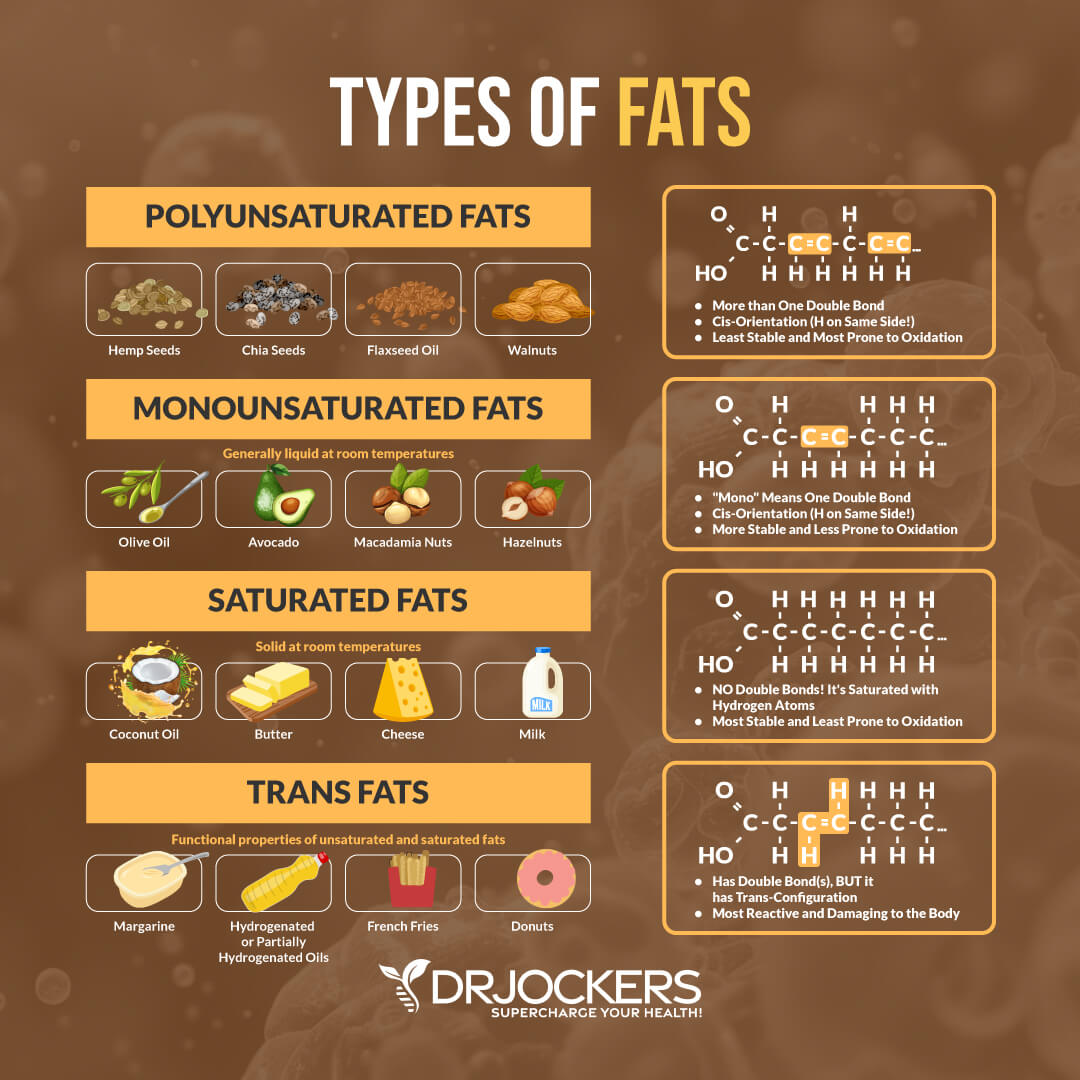
Importance of Healthy Fats
Contrary to a myth we have been fed for decades, fats don’t make you fat, and they are not bad for you. Your body actually needs healthy fats to thrive. Healthy is the key word here. So, what are healthy fats?
Healthy fats can be found in many sources, both animal and non-animal. Non-animal fats that are good for your body include olives, olive oil, avocados, avocado oil, coconuts, coconut oil, coconut milk, seeds, nuts, and nut butter. Healthy fats that come from animal sources include grass-fed butter, ghee, dairy, grass-fed meats, pasture-raised chicken, and egg yolks.
Healthy fats are essential for your cell membranes and hormones. They are critical for your brain health, organ function, and energy. They function as carriers for critical fat-soluble vitamins, including vitamins A, D, E, and K, and help with the absorption of minerals.
Research has found that eating a diet high in healthy fats and low in carbs may help reduce inflammation, regulate your blood sugar, reduce triglycerides, and increase longevity (1, 2, 3, 4). You can read more about the fats I recommend in this article.
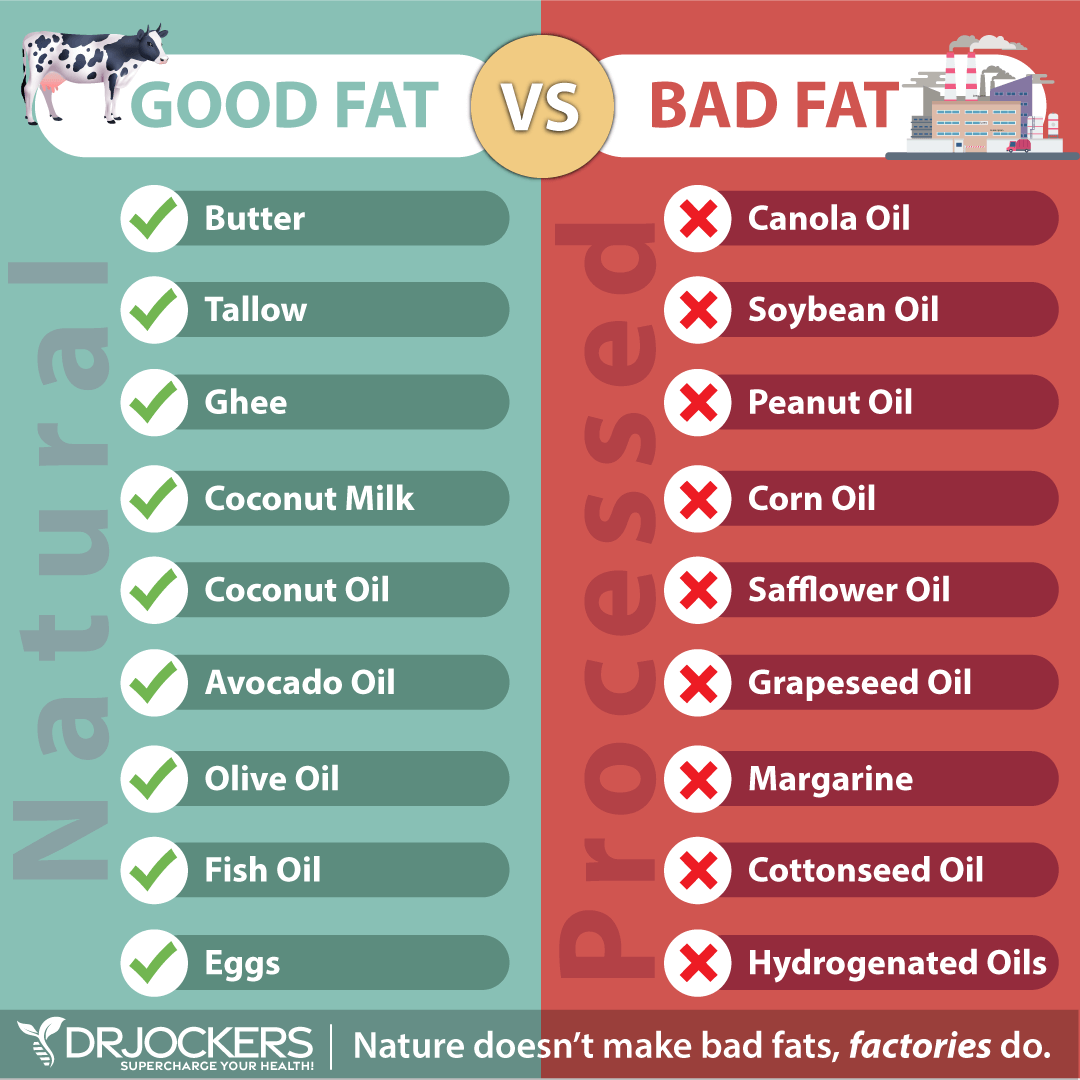
What Are Saturated Fats?
From the chemical perspective, the carbon molecules of fat molecules in saturated fats have no bonds between them because they are saturated with hydrogen molecules. Saturated fats tend to be solid at room temperature and melt at higher temperatures (when cooking, for example).
Saturated fats naturally occur in many foods and tend to come from animal sources, including fatty beef, beef fat or tallow, lamb, poultry with skin, butter, lard, cheeses, and other dairy products.
When it comes to saturated fats, you may be confused. Is saturated fat unhealthy? As I wrote about this in this article, cholesterol has been blamed as a major cause of heart disease, and high bad cholesterol has been connected to saturated fats. According to a 1994 study published in The Lancet, which analyzed fat in clogged arteries, only 26% of it was saturated animal fat.
The other 74% were unsaturated fats, such as the so-called ‘heart-healthy’ canola oil. Other studies also support that saturated fats are often not the cause of clogged arteries and heart disease. According to the research work of Dr. Mary Enig, Ph.D., an expert in lipid biochemistry, saturated fats and cholesterol are actually essential for cell membrane health, bone health, immunity, brain health, digestion, and heart health.
Saturated fats that come from natural sources, including butter, ghee, tallow, coconut oil, MCTs, lamb fat, duck fat, chicken fat, eggs, meat, and seafood, are good for your body. However, man-made saturated fats or trans fats, such as margarine, hydrogenated oils, and partially hydrogenated oils, are incredibly damaging and should be avoided (5, 6, 7, 8, 9, 10, 11).
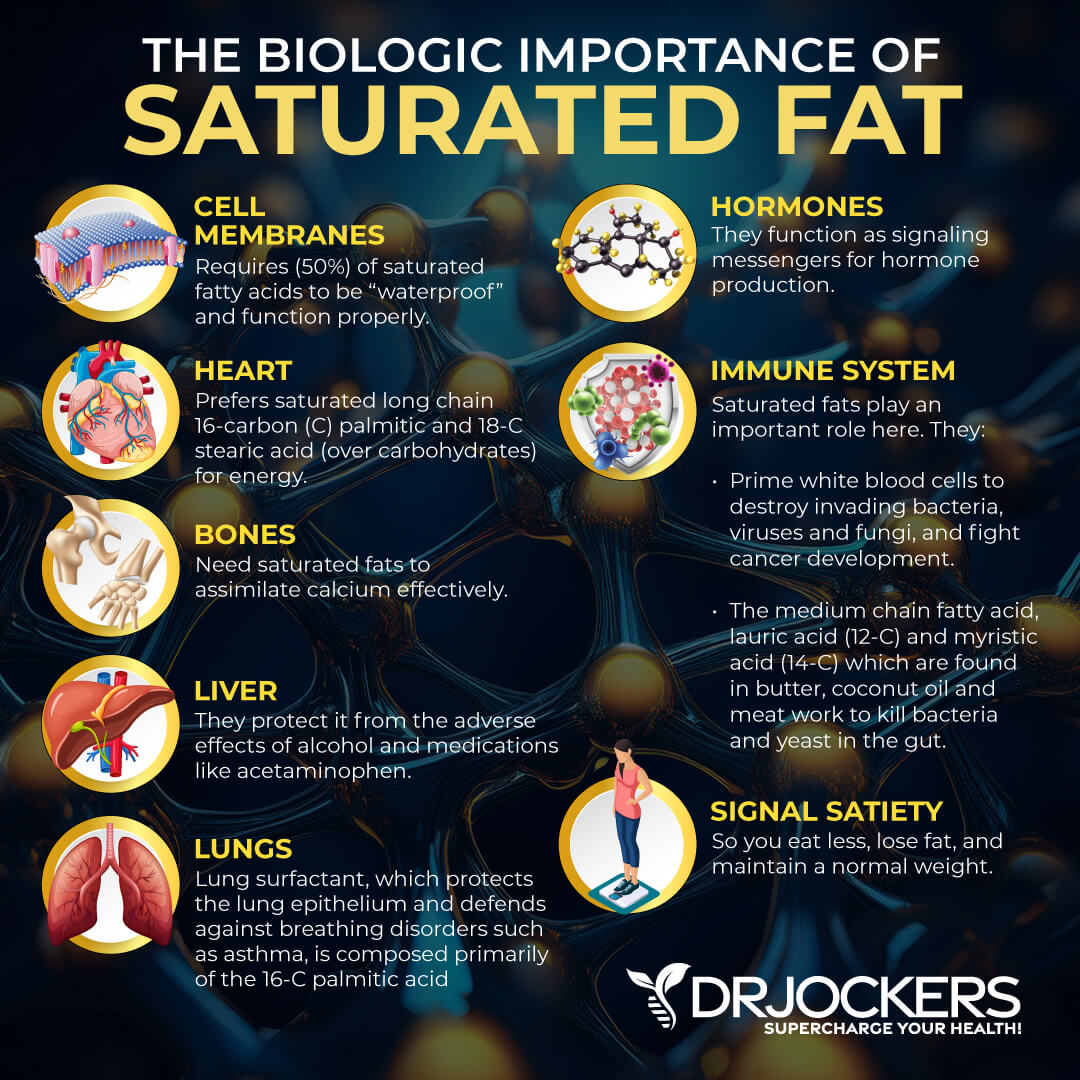
What Are Monounsaturated Fats?
Looking at their chemical make-up, the fat molecules of monounsaturated fats have one unsaturated bond within the molecule, called the double bond. These fats are liquid at room temperature but may solidify when chilled.
Monounsaturated fat sources include olives, olive oil, avocados, avocado oil, nuts, and nut butter. Research has found that monounsaturated fatty acids may reduce the risk of heart disease by reducing LDL and lowering cholesterol, improving body composition, supporting the function of your blood vessels, improving insulin sensitivity, helping to control your blood sugar, and lowering the risk of depression.
They are also rich in antioxidant vitamin E, which may help to fight free-radical damage, and according to a meta-analysis, may reduce the risk of endometrial cancer (12, 13, 14, 15).
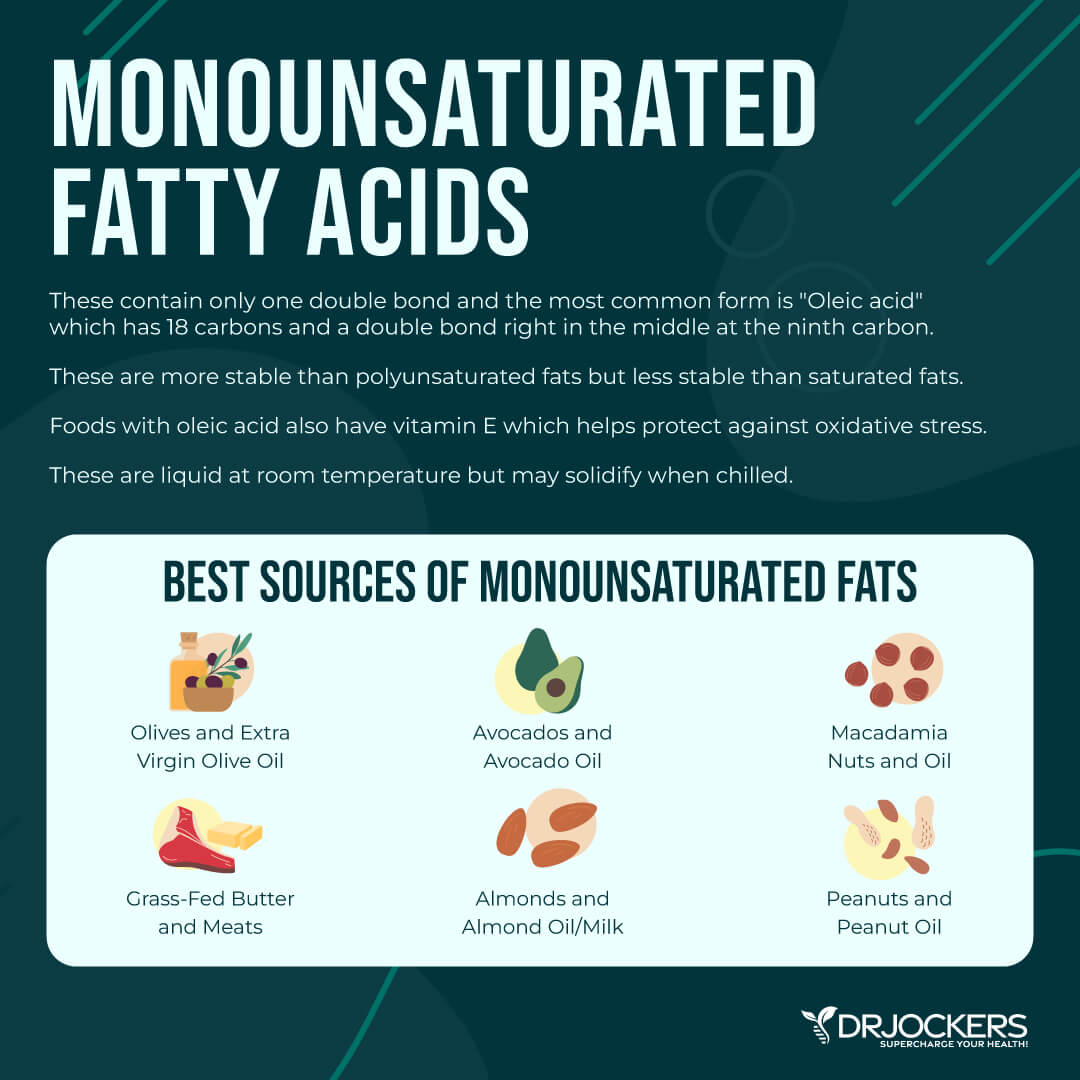
What Are Polyunsaturated Fats?
From the chemical perspective, polyunsaturated fats have more than one unsaturated carbon bond or double bond in their fat molecules. They are liquid at room temperature and may solidify when chilled.
Polyunsaturated fats are rich in the antioxidant vitamin E and may lower your risk of heart disease and stroke. Many polyunsaturated fats also contain omega-3 fatty acids that are essential for lowering inflammation and contributing to healthy body functions. However, you have to be careful with polyunsaturated fats that have been heated or oxidized, because these forms may contain free radicals and may increase inflammation in your body.
For this reason, I do not recommend certain polyunsaturated fats, including canola oil, corn oil, soybean oil, and sunflower oil. Instead, I recommend that you only use polyunsaturated fats cold and never when rancid or heated. Walnuts, sunflower seeds, other nuts, fish, and avocado oil are some great examples of polyunsaturated fats that are healthy, and I highly recommend them (16, 17, 18).
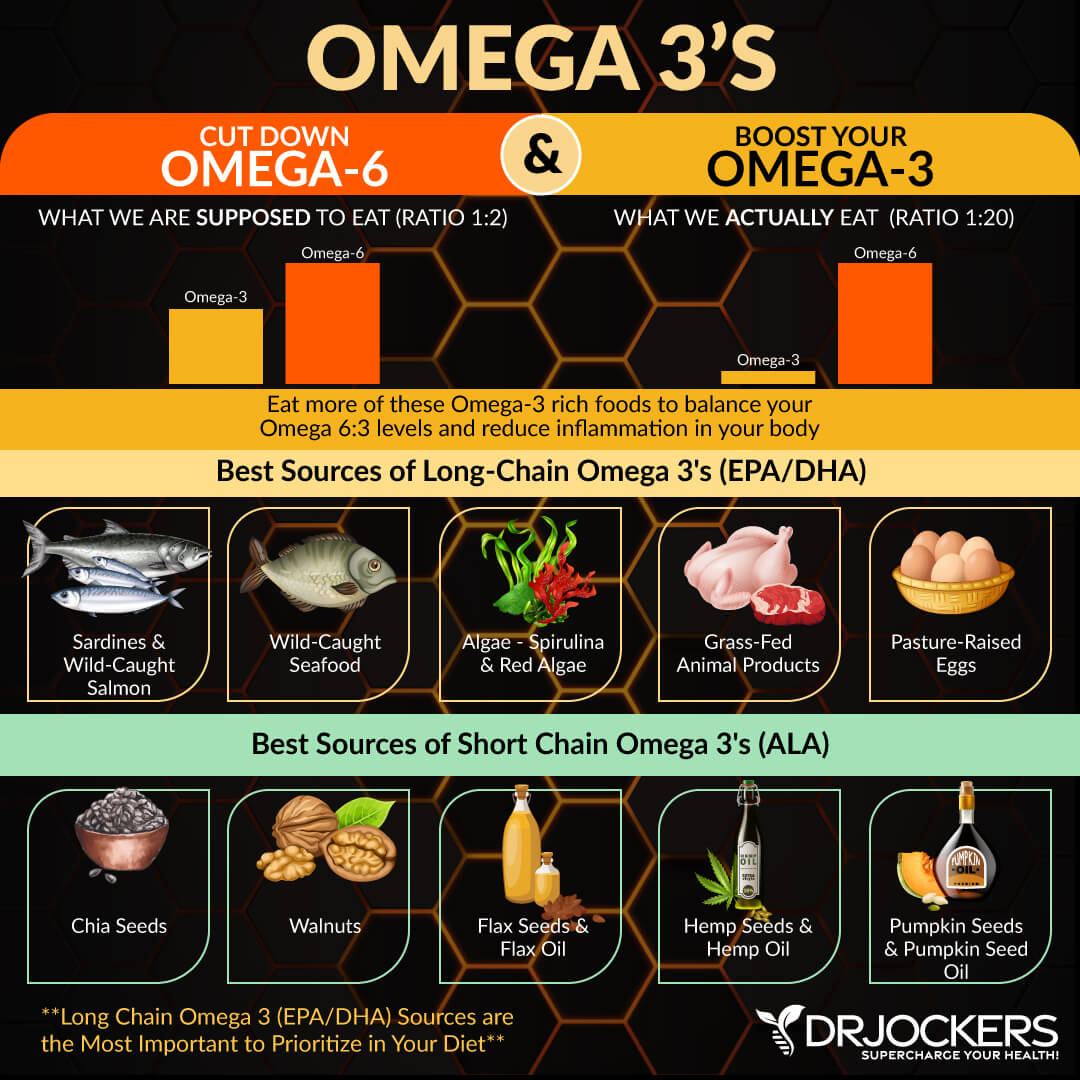
Recent Study on Cooking Oils
When you heat cooking oils, degradation and oxidation may occur, and potentially toxic by-products and free radicals may make it into your food, causing harm to your health. For years, the medical, health, and healthy cooking community focused on the smoke point of the oils as a guideline.
They suggested extra virgin olive oil and butter for low-heat applications and dressings; regular or refined olive oil for medium heat; and ghee, coconut oil, and avocado oil for high heat. They also recommended canola oil, grapeseed oil, and sunflower oil for high-heat cooking due to their high smoke points. Many articles and books still recommend canola oil as one of the top oils to be used for cooking, despite its health risks we’ve discussed earlier. These recommendations are outdated and may be harmful.
A 2018 study discovered that the common recommendation for oils may not be the best one, and looking at smoking points is not the best strategy. The study assessed the correlation between the smoke point of various oils and other chemical characteristics associated with safety. Out of all the oils that were tested, extra virgin olive oil and coconut oil were found to be the safest, and the commonly recommended canola oil didn’t turn out to be as safe as once thought (19).
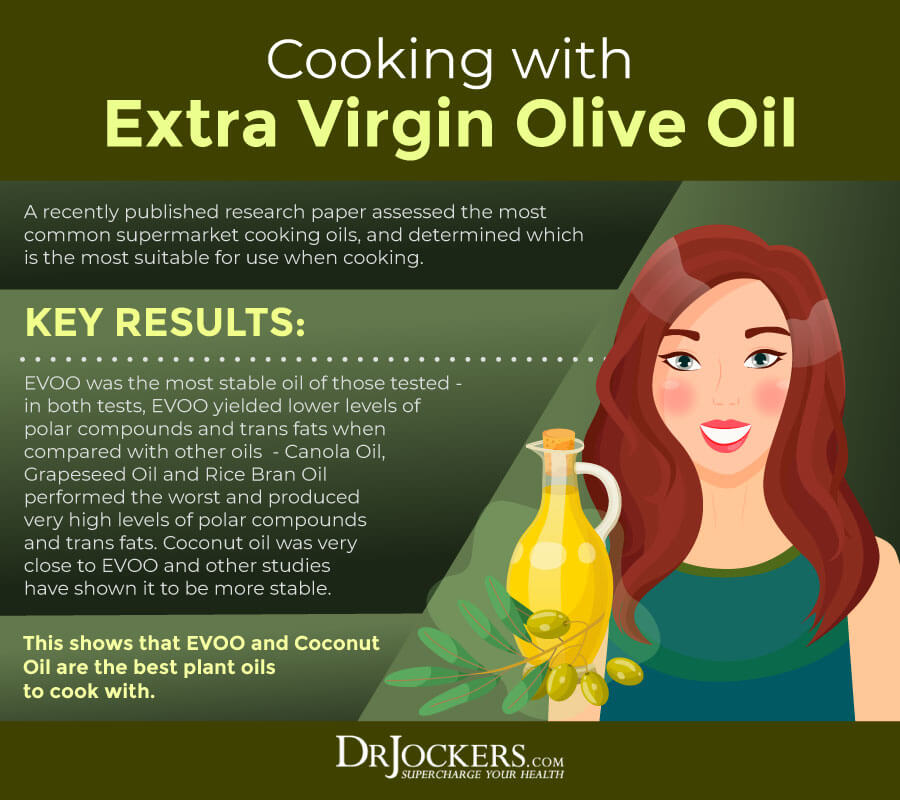
Smoke Point
Previous studies and discussions only looked at the smoke point as a reference for safety, disregarding potential toxic effects. This study found that the smoke point is not a good reference. Instead of simply measuring smoke points, they measured the toxic compounds that were released during cooking.
They performed two tests. They heated the oils gradually from 25 to 240 Celsius (77 to 464 Fahrenheit) and measured them at every 30-degree increase. They also heated the oils at 180 Celsius (356 Fahrenheit) for 6 hours, which is much longer than many slow cooking methods recommend. They measured samples at 30, 60, 180, and 360 minutes.
In each sample, they looked at oxidation, oxidation stability, fatty acid profile, and toxic byproducts or polar compounds. All the samples were cooled and analyzed later. The oils that were tested included: extra virgin olive oil, virgin olive oil, olive oil, canola oil, rice bran oil, grapeseed oil, coconut oil, high oleic peanut oil, sunflower oil, and avocado oil (19).
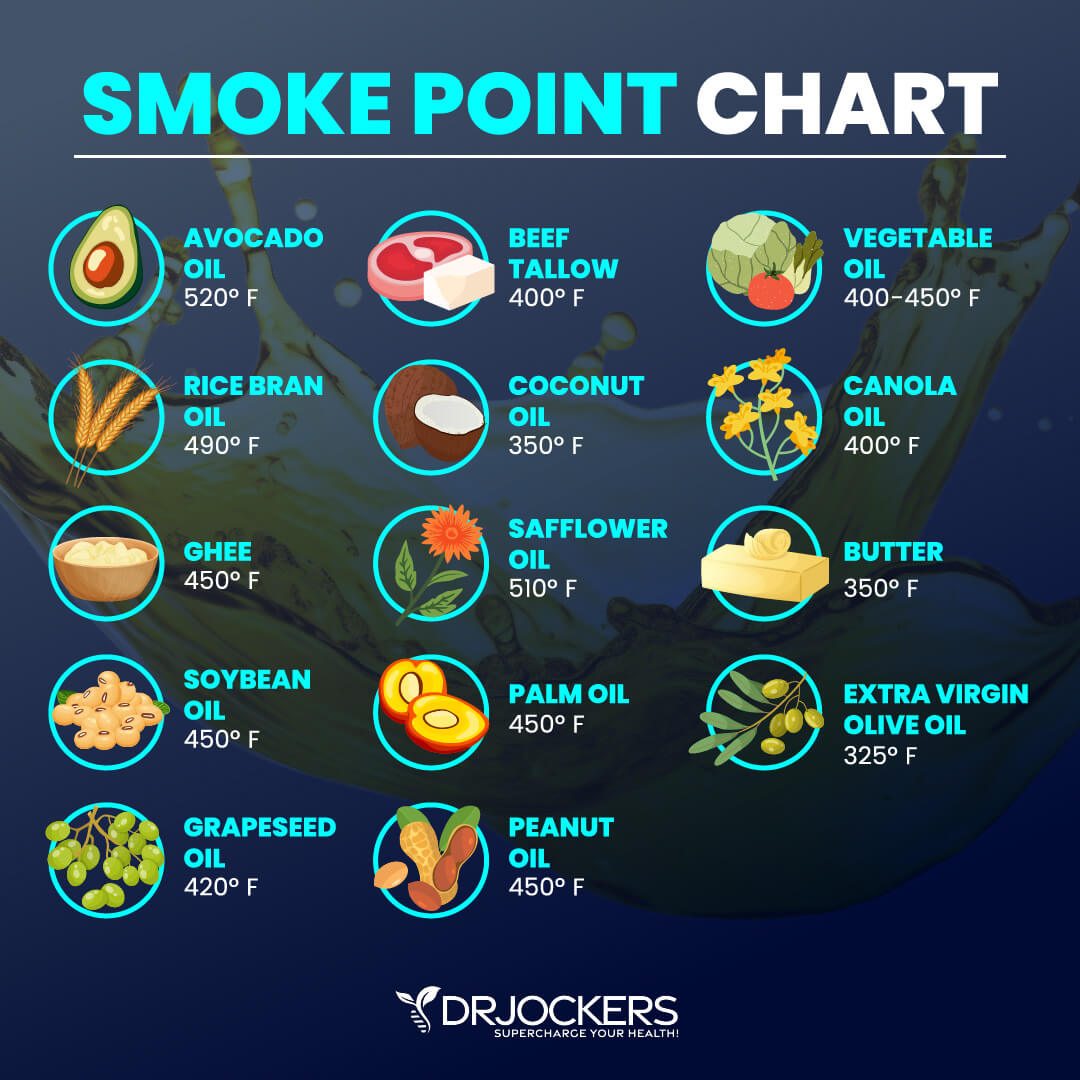
Trans Fat Development
There are two types of trans fat. Naturally occurring trans fats are created in the gut of some animals and occur in very small amounts in some fats in animal products coming from these animals. The other type of trans fats is artificial fats, and they are a huge health risk.
They are made through an industrial process by adding hydrogen to vegetable oils to create more solid oils. Partially hydrogenated oils are the most commonly used trans fats. Even though trans fats are widely used, you need to avoid them at all costs to protect your health.
Trans fats are inexpensive to produce, which is why they are so prevalent in processed foods and used by fast-food chains. However, they are incredibly harmful.
They raise your cholesterol levels, increase inflammation, and increase the risk of heart disease, diabetes, cancer, and other health issues. It is not surprising that this study found trans fats to be similarly harmful and found olive, coconut, and avocado oils to be better than trans fats and seed oils (19, 20).
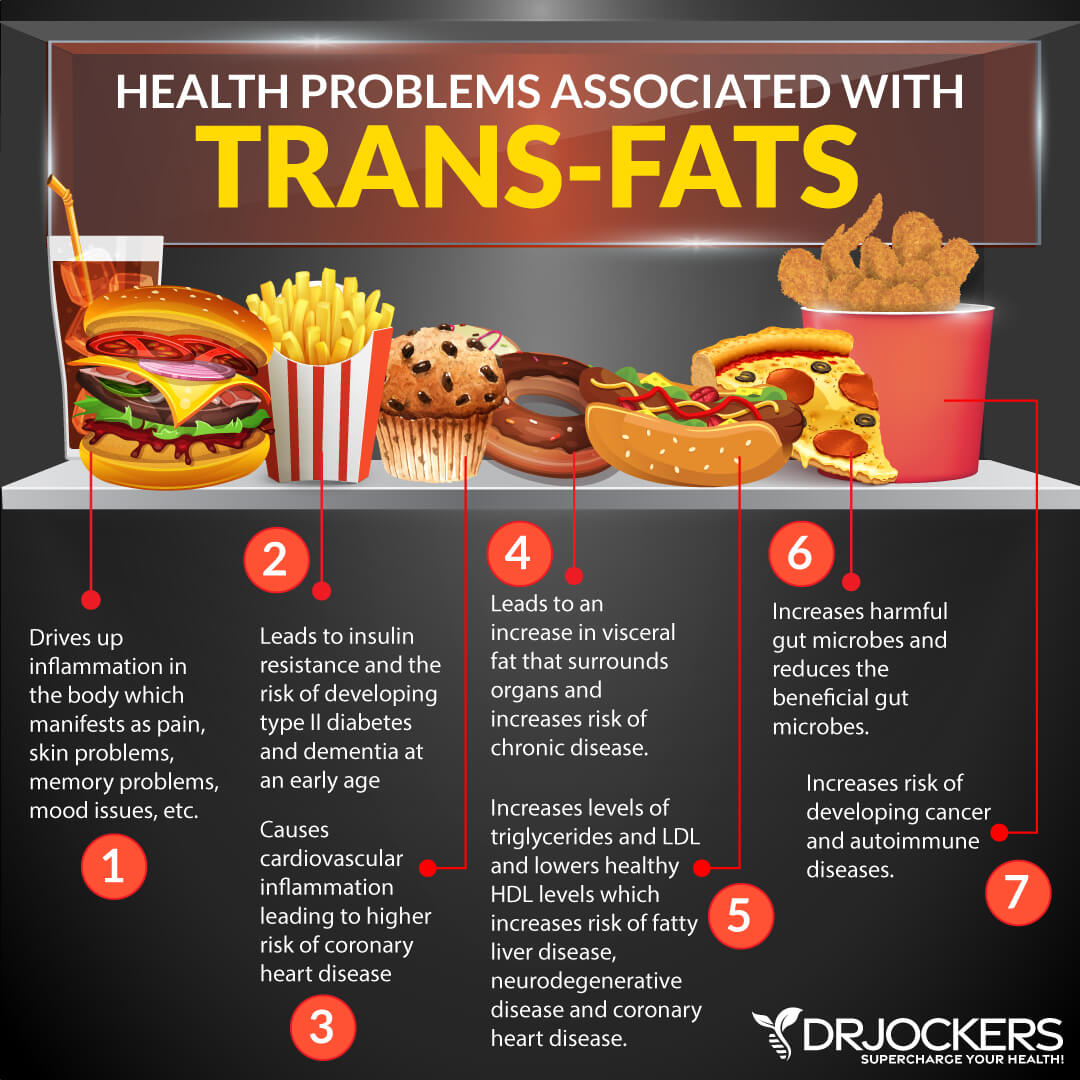
The Importance of Polar Compounds
Polar compounds are toxic byproducts that have been associated with neurodegenerative diseases, including Alzheimer’s and Parkinson’s disease, and the development of various types of cancer. Therefore, it is critical that we understand what this study found out about polar compounds and oils.
It takes more energy to break down saturated fats than polyunsaturated and monounsaturated fats. The more energy needed for breaking the chemical bonds in oils, the more free radicals may occur. At 90 percent of saturated fats, coconut oils are very high in saturated fats, so it is not surprising that you see them at the bottom of the charts.
It is more surprising to find extra virgin olive oil neck-in-neck with coconut oil, since extra virgin olive oil is high in monounsaturated fats. This suggests that oils that are rich in antioxidants also need a lot of energy to break the bonds, which also means that the toxic by-products that are formed are lower. The study suggests that virgin and refined olive oil have fewer antioxidants than extra virgin olive oil due to processing and filtration.
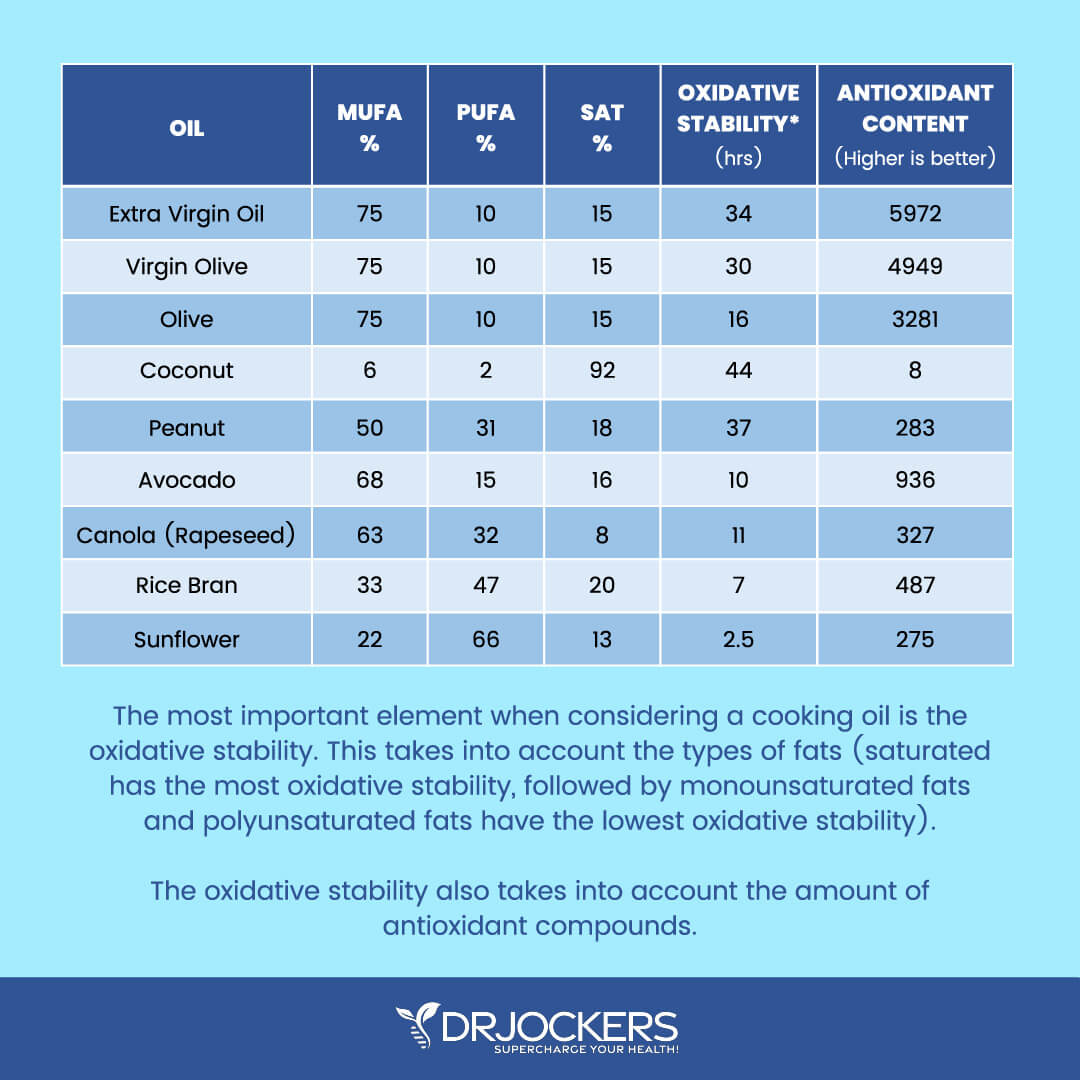
Smoke Point Does Not Indicate Oxidative Stability
They also found that even though canola and grapeseed oil both have high smoke points and should be stable at higher temperatures, both showed a significant spike in polar compounds and toxicity at over 150 Celsius. Avocado and refined olive oil fared better than canola and grapeseed oil, as they only noticed a small spike at over 180 Celsius.
The results of the study clearly suggest that the smoke point of the oils is not a stable number and, not an indication of safety. The oxidative stability, which is based on the level of saturated and monounsaturated fats, which are more stable than polyunsaturated fats, along with antioxidant compounds in the oil, is a much more important factor.
In the analysis, we must look at polar compounds that may lead to toxicity, inflammation, and disease. Looking at the results, extra virgin olive oil is clearly the best choice, and coconut oil is a close second. Other studies have shown coconut oil to be slightly more stable.
It is also clear that not all oils are made equal. Regular and virgin olive oils, although sometimes cheaper, are processed and filtered, hence have fewer antioxidants and are less safe. Extra virgin olive oil, however, is high in antioxidants and is the healthiest choice.
When shopping for cooking oils, make sure to invest in high-quality extra virgin olive oil or high-quality coconut oil. You may also use high-quality grass-fed tallow, butter, or ghee as a safe and healthy animal source. I will discuss the benefits of these oils and fats in the next section (19, 21).
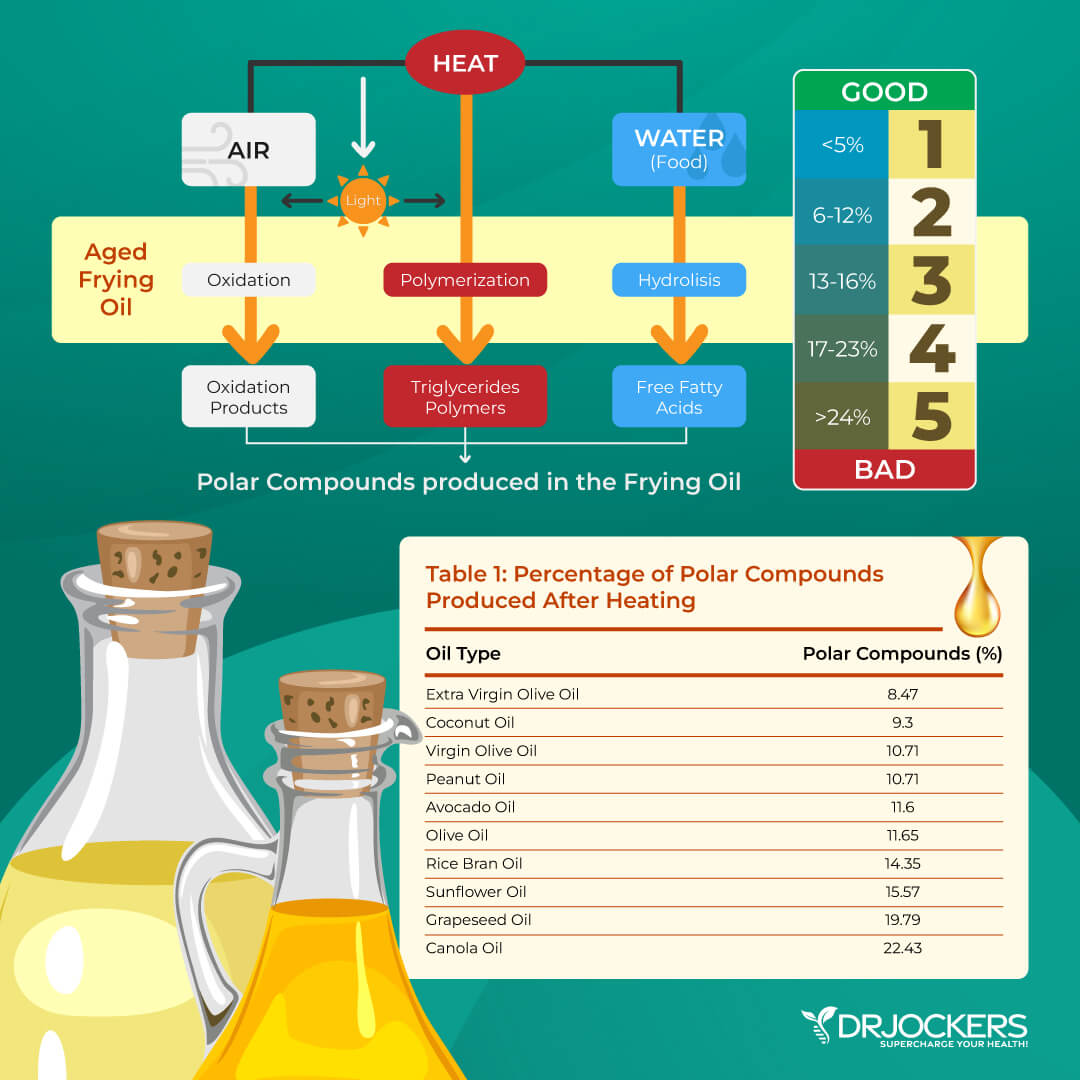
My Favorite Fats and Cooking Oils to Use
Now that you understand the importance of healthy fats, you may be wondering what the best ones you should use regularly. Here is a list of my favorite fats and cooking oils I use regularly and recommend to everyone.
Virgin Coconut Oil
Virgin coconut oil is one of the best heart-healthy fats out there. It contains small- to medium-chain saturated fats called medium-chain triglycerides (MCTs). MCTs permeate your cell membranes, providing energy.
They boost your immune system and offer antiviral, antibacterial, and antimicrobial benefits. Coconut oil is 92 percent saturated fat, yet it offers benefits for your heart health and supports healthy cholesterol and triglyceride levels (22, 23).
You can use coconut oil without cooking in no-bake bliss balls, smoothies, shakes, and coffee. However, it is an excellent cooking oil as well. It has a high smoke point, it does not oxidize; instead, it remains stable and keeps its antioxidant benefits even under high heat. I recommend using organic, unrefined, virgin coconut oil for optimal benefits.
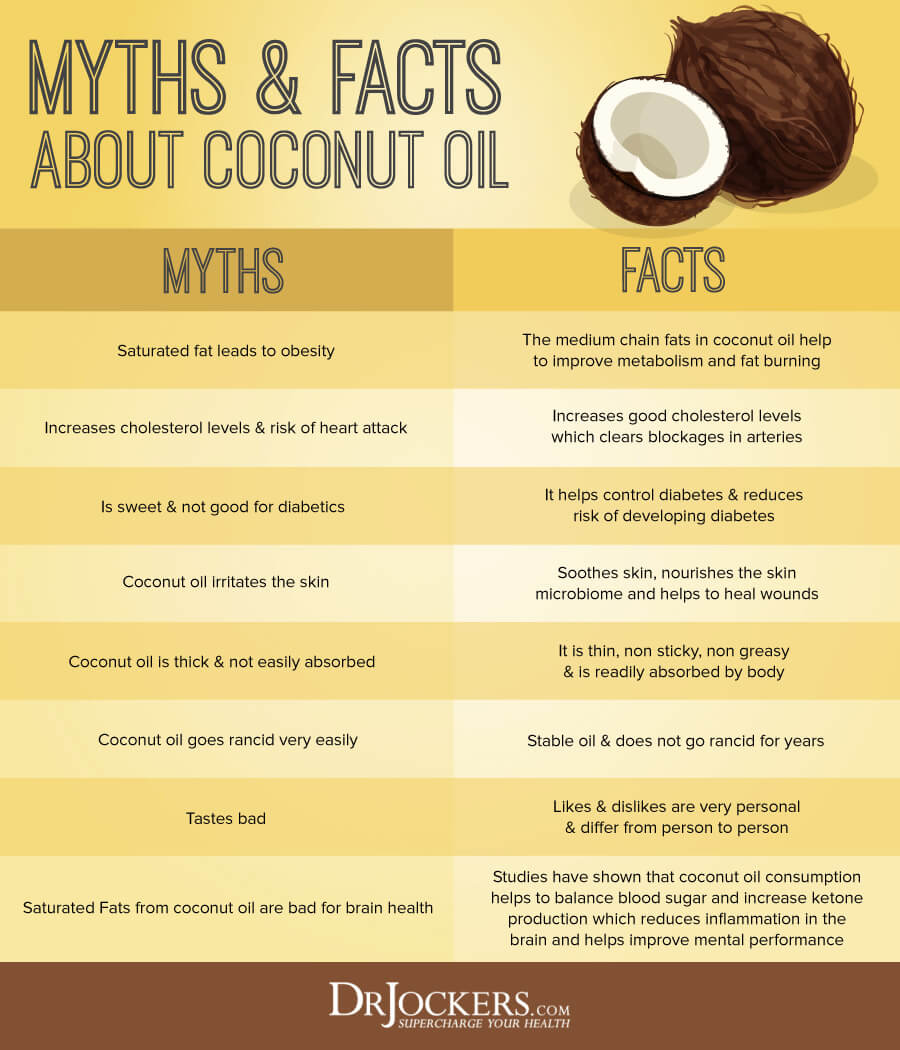
Grass-Fed Butter or Ghee
Grass-fed butter and ghee are nutritious and are a source of healthy fat. They are primarily stable saturated fats that contain short- and medium-chain triglycerides. They support your immune system and metabolic health.
Grass-fed butter has high levels of butyrate, arachidonic acid (ARA), and conjugated linoleic acid (CLA), which may offer benefits to your heart health, lower inflammation, promote energy, support your digestion, help to decrease belly fat, and improve artery function. Grass-fed butter is also a fantastic source of vitamin A, D, E, and K2. It may benefit your adrenal glands, thyroid, and cardiovascular health, and may help to reduce oxidative stress (24, 25).
Many Americans think that choosing margarine is better than butter. However, margarine is not healthy, and I do not recommend it. Research has shown that margarine may increase the risk of heart disease, while butter and ghee do not. I recommend grass-fed butter or ghee for optimal benefits, both for cooking and for non-cooked meals. You may learn more about the benefits of grass-fed butter in this article.
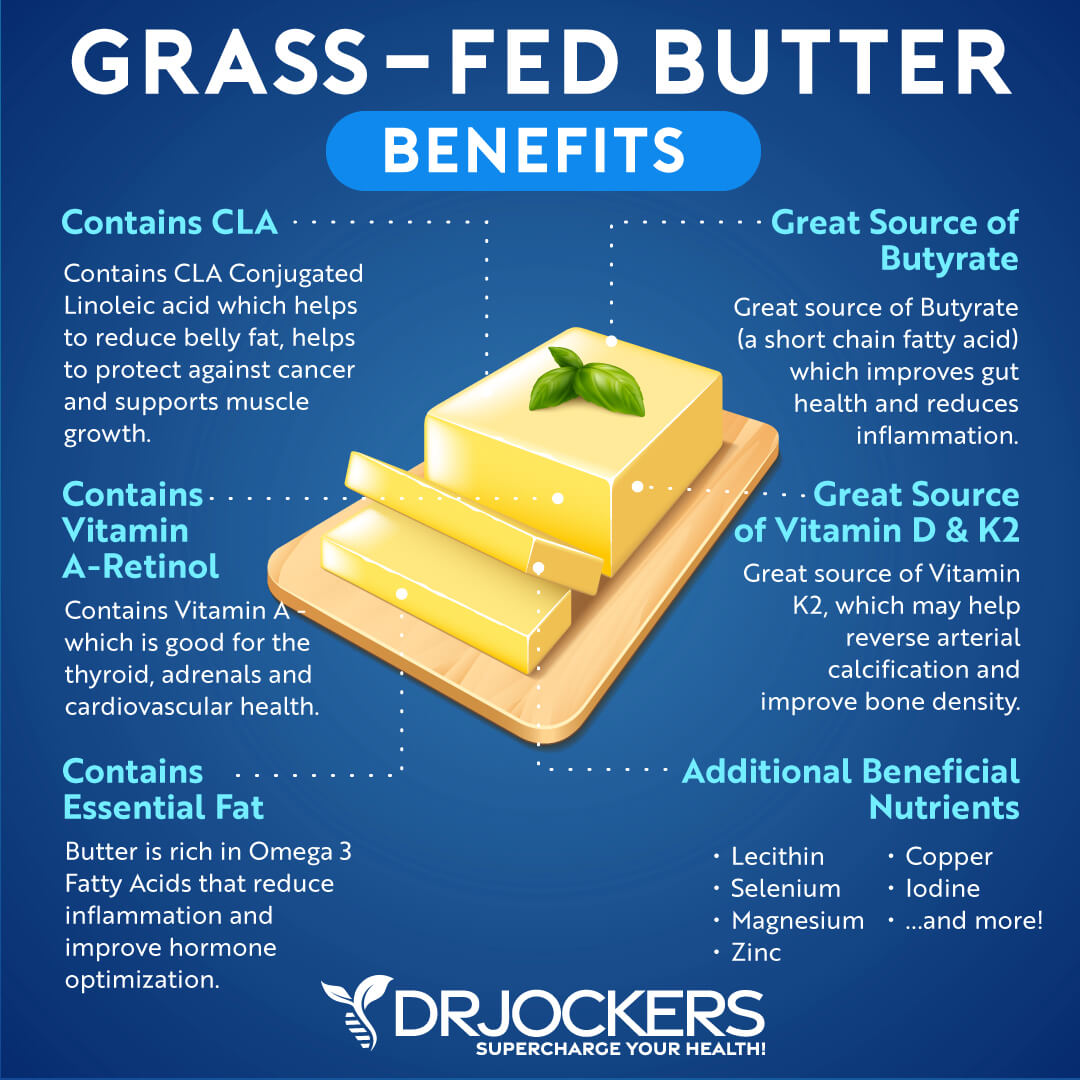
Grass-Fed Beef Tallow
Tallow is a rendered form of beef fat. It is mainly made up of triglycerides. It is solid at room temperature and melts during cooking. Beef tallow is rich in vitamins A, D, E, and K. It is also rich in conjugated linoleic acid (CLA), which is great for the immune system and stimulates fat burning. It is about 50 percent healthy saturated fat, 46 percent monounsaturated fat, and 4 percent polyunsaturated fat, providing a great mix of fat sources (26).
Beef tallow is great for frying and any other oil-cooked meals. To prevent oxidation, I recommend keeping it in an airtight container. It stores well and keeps for a long time even without refrigeration. To avoid any hormones and pesticides and to ensure maximum health benefits, it is important that you make sure to use organic grass-fed beef tallow. I recommend and personally use EPIC Rendered Beet Tallow.
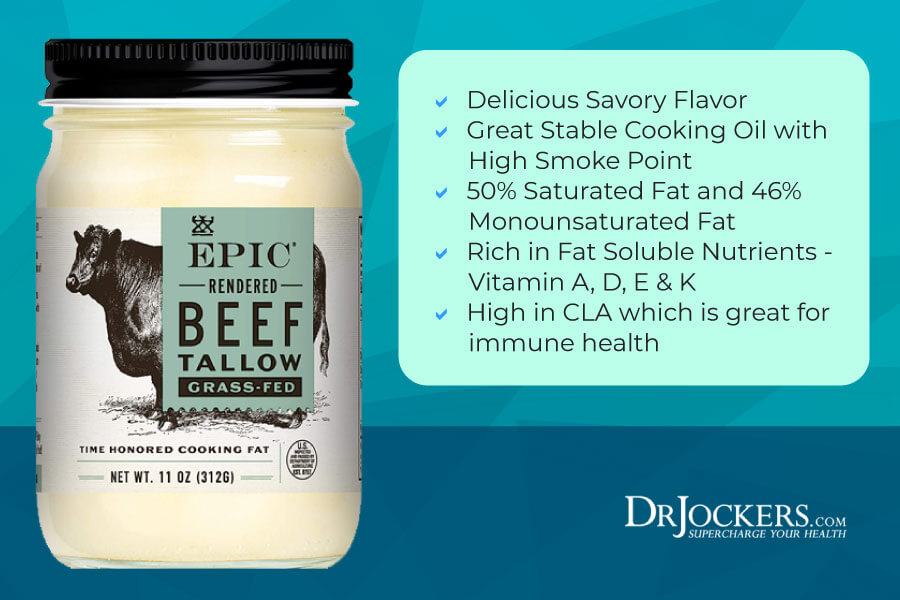
High Quality Extra Virgin Olive Oil
Olives and olive oil are fantastic sources of healthy fats. Olives contain lots of fiber, vitamin E, copper, and calcium. Olive oil offers the same benefits except for the fiber.
Research has shown that both polyunsaturated and monounsaturated fats in olive oils may decrease the risk of heart disease. Olive oil is also rich in phenolic compounds or polyphenols that, according to a scientific paper, may benefit atherosclerosis and cardiovascular disease prevention and recovery.
These polyphenols have shown positive benefits on oxidative damage, inflammation markers, antimicrobial activity, platelet and cellular function, and plasma lipoproteins. It may help to regulate blood sugar levels and help break down fatty acids by increasing adiponectin protein hormone levels (27, 28). Here is a great image from the North American Olive Oil Association.
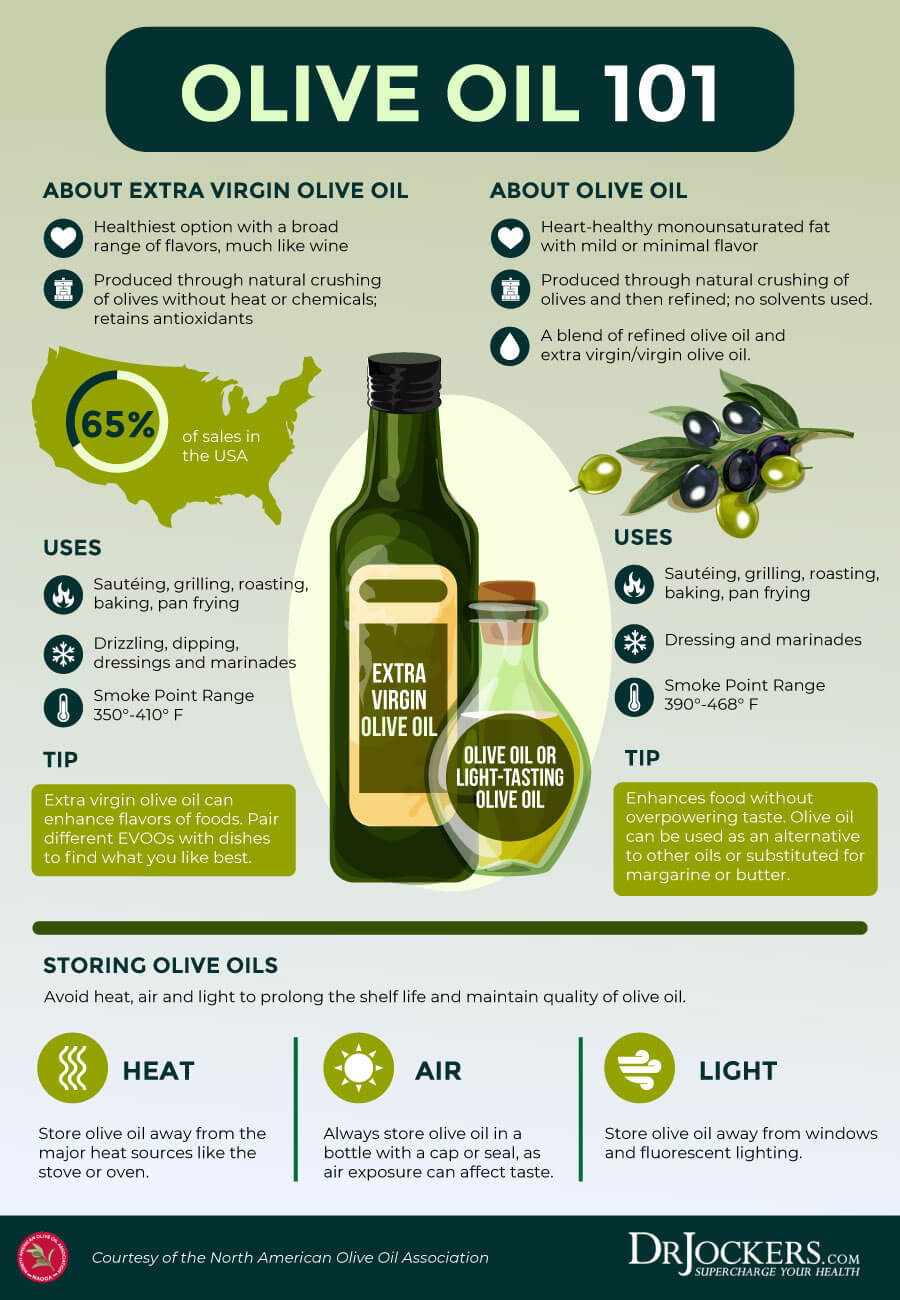
My Favorite Olive Oil
I recommend using a high-quality extra virgin olive oil for optimal benefits. Extra virgin olive oil is the best and safest form of olive oil with the richest flavor.
My favorite olive oil is this Fresh-Pressed Olive Oil. It is the most flavorful artisan olive oil you can find out there. It comes from award-winning artisan farms with a harvest-fresh taste to your table. These oils are independently lab-certified to be 100 percent extra virgin olive oil, so you can trust the quality. My family swears by it. We use it daily on our salads and meals. Our kids love it. I am sure your family will, too.
I am excited to share a special offer with you. You can get this $39.00 bottle of Fresh-Pressed Olive Oil for only $1.00 to help with shipping if you click on the link here.
Final Thoughts
Your body needs healthy fats for hormonal and brain health, energy, immune function, inflammation reduction, and other areas of your health. Healthy fats, including healthy cooking oils, are your friends that can be and should be part of your healthy diet. Try my favorite healthy fats and cooking oils that I recommend.
They not only add to the delicious flavor of your nutritious meal but are beneficial for optimal health and well-being. For healthy recipes that use healthy fats and oils, I recommend that you browse the recipe section of our website, which is full of my favorite nutrient-dense dishes.
If you enjoy learning about cutting-edge nutritional science, you may be interested in my advanced nutrition and recipe book, the Keto Metabolic Breakthrough.
If you want to work with a functional health coach, I recommend this article with tips on how to find a great coach. On our website, we offer long-distance functional health coaching programs. For further support with your health goals, just reach out—our fantastic coaches are here to support your journey.

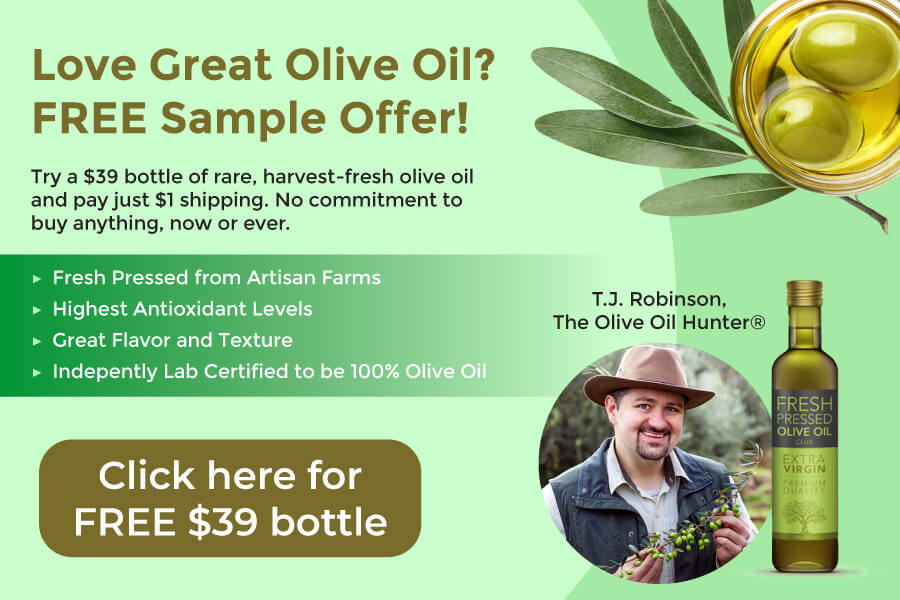
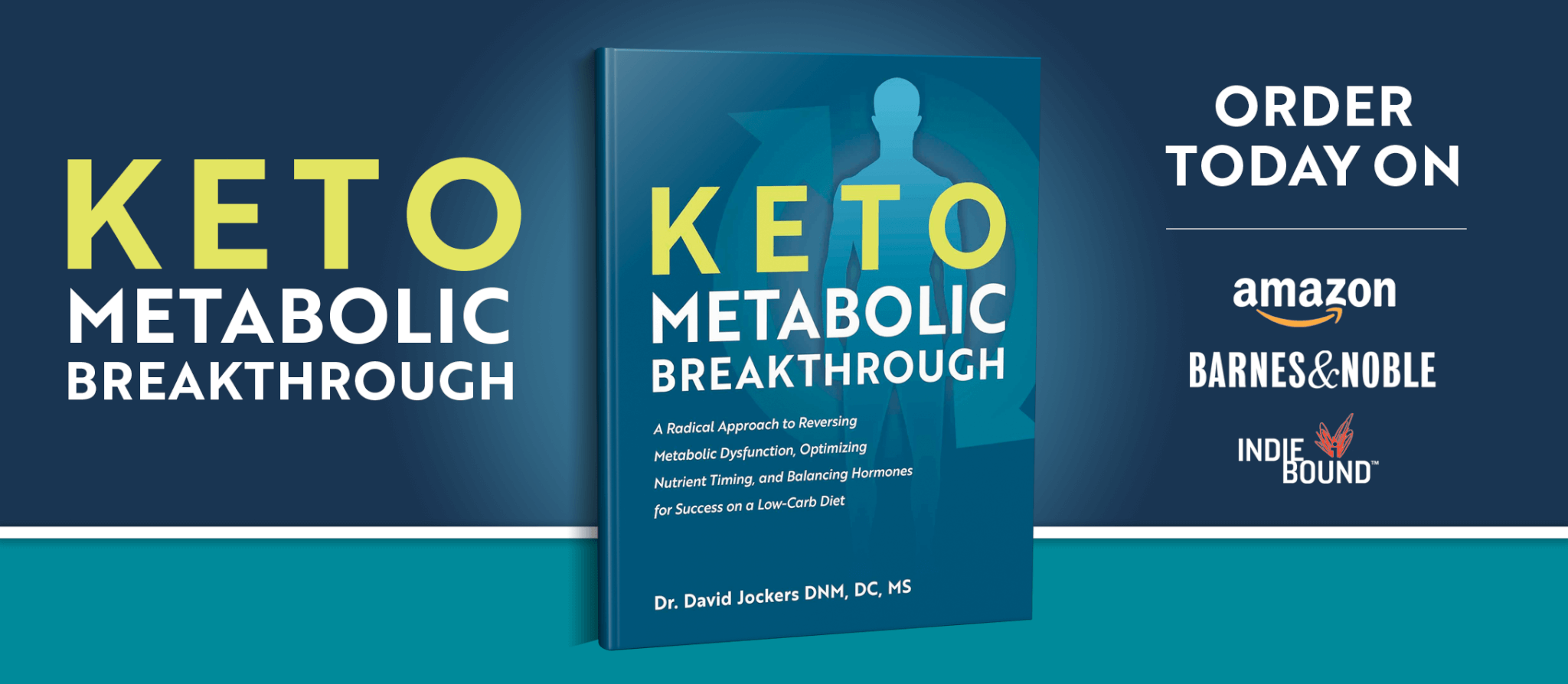



Thank you once again for a well-researched, informative and very practical article on a most confusing subject David!
Thank you Henk!